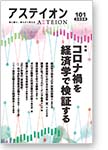
-
Photographic Report
Connecting the World With Hyakunin Isshu Karuta
(One Hundred Poets, One Poem Each):
An English-Language Hyakunin Isshu Karuta Event in Kyotoby Xuejian Yu -
Commentaries
〈History〉 On History and Educationby Takashi Okamoto -
〈Gender〉 Shifting Conceptions of Masculinity as Seen in the Akita Pole Lantern Festival by Yuzu Murakami -
〈Politics〉 Hopes Within the Disillusionment Toward Established Political Parties by Maho Ikeda -
Special Feature: The COVID-19 Pandemic Through the Lens of Economics
Preface: The Reality of the COVID-19 Policy Response through Economicsby Takero Doi -
The Role of Economics/Economists in the COVID-19 Policy Response by Fumio Ohtake -
The Marked Inequality in Well-Being Post-COVID-19 by Isamu Yamamoto -
Lessons From Pandemic Employment Support Programs by Tadashi Sakai -
The Aftermath for Businesses Using “Zero-Zero Loans” by Iichiro Uesugi -
The Emergency Medical Response by Yukiko Ito -
A Postmortem on the COVID-19 Policy Response Takero Doi questions
Yayoi Tanaka,
President of the Board of Audit of Japan -
〈Column〉 The Economic Impact of the Tokyo 2020 Olympics by Katsuhiro Miyamoto -
Chronology and Graph of the COVID-19 Pandemic in Japan Compiled by
Yoshiyuki Sagara
and Takero Doi -
Essays
The Spell Cast by the Teleological Intelligent Design Argumentby Kenji Matsuura -
On the Justice of “Compliance” by Hiroshi Watanabe -
Why “Taipa” (“Time Performance,” i.e., Time Efficiency) Has Penetrated Japanese Society: Social Symbols and the Study of Modern Social Phenomena by Toyoshi Inada -
The Power of Haiku “Season Words” by Itsuki Natsui -
The Latest Thing Hiding Within the Passé by Shigeru Kashima -
Photographic Report
A Century of Phototypesetting and Letter Printingby Takuya Abe -
Correspondence
〈Turkey〉 A Seven Treasures Cloisonné Flower Vase and
a Baghdadi Wall:
The First Japanese Embassy in the Middle Eastby Miyuki Aoki Girardelli -
〈France〉 Paris Imitating Paris:
The “Grand Paris” Redevelopment Scheme and Olympics City Planningby Miyo Aramata -
〈Benin〉 Language to “Connect the Head and the Body”:
Decolonization and the Modern Art Scene in Beninby Yuko Nakamura -
〈US〉 The Return of Oysters to NY Harbor by Kosuke Hatta -
Report: Asia Under the New Cold War Between the US and China
Asia Under the New Cold War Between the US and Chinaby Takashi Shiraishi -
The Asian Development Bank and China by Takehiko Nakao -
The New Government in Taiwan and Xi Jinping’s China by Shin Kawashima -
Book Review
The Vitality of the British MonarchyJunko Saeki questions Naotaka Kimizuka -
Essays
Do Trees Rot Part 2by Terunobu Fujimori -
Hakucho Masamune and Bin Ueda by Daisaburo Okumoto -
On Quitting by Naoyuki Agawa -
Article
The Speeding Up of Western Music:
What Can Be Learned From the History of Musical Notationby Kiichi Suganuma -
Memorial
Personal Memories of Makoto Iokibeby Shinichi Kitaoka -
The Legacy of Makoto Iokibe A discussion with
Ikuo Kabashima,
Ryosei Kokubun,
Takashi Mikuriya
and Toshimitsu Kishi -
Makoto Iokibe Chronology Compiled
by the Asteion Staff
Asteion was launched in 1986, a time when intellectual endeavor was still being held back by competing ideologies. Things have moved on since then. By adopting a more flexible approach and tuning our senses to a broad range of global issues, rather than churning out articles focusing solely on current affairs, we have developed a keen understanding of contemporary trends. The name Asteion comes from the Ancient Greek "ASTEION," meaning sophisticated and refined. This reflects our desire to stimulate intelligent discourse among those who are independent and yet share the same public space as fellow citizens through active but sensible exchanges of diverse opinions. A quarter of a century on, the competing ideologies that marked the twentieth century have now converged, leaving us free to express our opinions on an endless range of subjects. Our mission to promote genuine debate is all the more important for shedding light on the mega-waves of our time. We hope that more and more people, each interested in public issues in their own way, will come to share the spirit of Asteion and support our efforts. Masayuki Tadokoro Chair, Asteion Editorial Committee
![]()
![]()
|
|---|
- Vol.100 An Arena for Intellectual Opinion and Debate:Commemorating One-Hundred Issues
- Vol.099 Artists Crossing Borders
- Vol.098 A Historical Perspective on the “Chinese Dream”? : The Extent of the Sinosphere in East Asia
- Vol.097 The Ukraine War: A Global Perspective
- Vol.096 Common Sense in Economics, Common Sense in Popular Thought
- Vol.095 Academic Journalism
- Vol.094 Once Again, What Are Today’s Problems?
- Vol.093 A New American Century?
- Vol.092 The “Patchwork” Order Encompassing the World
- Vol.091 The Future as Possibility – Japan in 100 Years
- Vol.090 Redefining the State: 130 Years Since the Meiji Constitution
- Vol.089 The Paradox of Choice of Citizenship
- Vol.088 Special Feature: The End of the Liberal International Order?
- Vol.087 Special Feature: Chinese-Language Literature Beyond China



